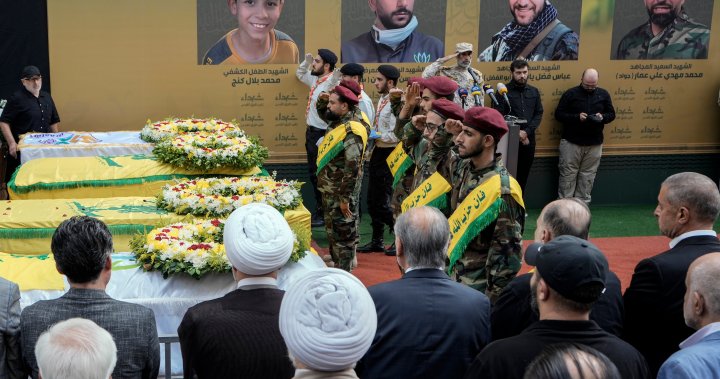
Israel’s focus shifts north as tensions climb after Hezbollah pager blasts
Global News
Speaking to Israeli troops on Wednesday, Israeli Defense Minister Yoav Gallant said, 'We are at the start of a new phase in the war.'
Hezbollah fired a new barrage into northern Israel on Thursday, continuing its drumbeat of exchanges with the Israeli military as fears of a greater conflict rise after hundreds of electronic devices exploded in Lebanon, killing at least 32 people and wounding more than 3,000 others.
The device explosions appeared to be the culmination of a monthslong operation by Israel to target as many Hezbollah members as possible all at once. Over two days, pagers and walkie-talkies used by Hezbollah detonated, wounding and even crippling some fighters, but also maiming civilians connected to the group’s social branches and killing at least two children.
It was unclear how the attack fit into warnings by Israeli leaders in recent weeks that they could launch a stepped-up military operation against Hezbollah, Lebanon’s strongest armed force. The Israeli government has said its aim is to end the Iranian-backed group’s crossborder fire in order to allow tens of thousands of Israelis to return to homes near the border.
Speaking to Israeli troops on Wednesday, Israeli Defense Minister Yoav Gallant said, “We are at the start of a new phase in the war — it requires courage, determination and perseverance.” He made no mention of the exploding devices but praised the work of Israel’s army and security agencies, saying “the results are very impressive.”
Gallant said that after months of fighting Hamas in Gaza, “the center of gravity is shifting to the north by diverting resources and forces.”
Hezbollah said early Thursday it had targeted military positions in northern Israel, without specifying what weapons it used. Israeli hospitals reported that they treated at least eight patients injured in the attacks. The military said early Thursday that it had struck several militant sites in southern Lebanon overnight.
The volley of strikes was a signal by Hezbollah that it would continue its near daily fire, which it says is a show of support for Hamas amid Israel’s 11-month-old campaign in Gaza in retaliation for the Palestinian militants’ Oct. 7 attack on Israel.
Israel has responded to Hezbollah’s fire with strikes in southern Lebanon, and has struck senior figures from the group in the capital Beirut. The exchanges have killed hundreds in Lebanon and dozens in Israel and forced the evacuation of tens of thousands of residents on each side of the border.













